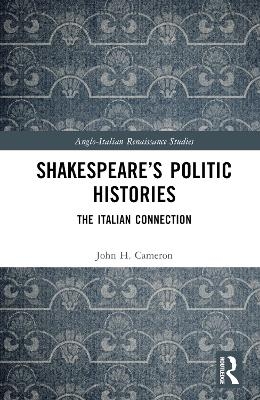
Shakespeare’s Politic Histories
Routledge (Verlag)
978-1-032-52308-8 (ISBN)
This book posits that Shakespeare’s First Tetralogy draws inspiration from the Italian “politic histories” of the early modern period. These works of history, influenced by the Roman historian Tacitus, delve into the exploration of the machinations of power politics in governance and the shaping of historical events. The argument is that closely analysing these Italian “politic histories” can significantly enhance our understanding of the “politic” aspects dramatized in Shakespeare’s early English History plays. Specifically, the writings of Niccolo Machiavelli are highlighted as contributing to this understanding. These “politic histories” were accessible (in a variety of forms) to many English early modern writers, including Shakespeare. Thus, they serve as foundation for political and strategic analogies, enriching our interpretation of Shakespeare’s politic histories.
While delving into the Italian “politic” historians can illuminate Shakespeare’s achievement, it is suggested that we should regard the English History plays as “politic histories” in their own right. In essence, they are dramatized versions of precisely the same kinds of “politic” historical writing, with its emphasis on ragion di Stato or raison d’état. This emphasis on what the Elizabethans called “stratagems” introduces new approaches to interpreting the plays. Considering the motivation and action of its characters entails novel approaches that challenge the established reading of the plays’ ‘Machiavellian’ characters (particularly Richard III) and shed light on previously overlooked characters (particularly Buckingham and Stanley), revealing their considerably greater strategic acumen. This exploration provides fresh avenues for reading the Shakespeare’s politic histories and better appreciate their Italian connection.
John H. Cameron teaches English Literature at Saint Mary’s University as well as German and Russian Literature at Dalhousie University. He is the editor of Narrative is the Essence of History and co-editor (with Goran Stanivukovic) of a special issue of Forum for Modern Language Studies that explores the development of comedy across different theatrical traditions (July 2022). He is the co-author (with Goran Stanivukovic) of Tragedies of the English Renaissance.
Acknowledgements
Introduction
1 Shakespeare’s Politic Histories: The Italian Connection
Politic Histories, Politic Stratagems
The Prince: A Prolegomena
Gracing My Stratagems: Politic Drama
2 The First Tetralogy, Shakespeare’s Politic History
Things Not as They Ought to Be, but as They Truly Are
Might vs. Right
Trust and Distrust
The Fox and the Lion
With silence, be politic: Waiting for the Right Moment
Weakness and Cruelty
3 ‘Made I him king for this?’: Buckingham and the Choice of Ministers
Choosing the Right Minister, Choosing the Right Prince
Give us notice of his inclinations: The Use of Spies
Playing the Orator, Playing the Crowd
Stops he now for breath? The Limits of Politic Stratagems
4 Stanley, the True Machiavellian of Richard III
Stanley, the Quiet Machiavellian
What think’st thou, then, of Stanley? Hiding One’s Intentions
Look unto it: Failing to See Past the Surface
What says Lord Stanley? Choosing the Right Moment
5 ‘For few men right temper with the stars’: Fortuna and Virtù
Tempering with the stars
Fortune Favours the Bold: The Nature of Virtù
Fortuna vs. Virtù, or Fortuna and Virtù?
Conclusion ‘My kingdom for a horse!’: The Hollow Crown
My kingdom for a horse! The Hollow Crown
For one commanding all, obey’d by none: Some Closing Thoughts
Bibliography
Index
| Erscheinungsdatum | 28.12.2023 |
|---|---|
| Reihe/Serie | Anglo-Italian Renaissance Studies |
| Verlagsort | London |
| Sprache | englisch |
| Maße | 152 x 229 mm |
| Gewicht | 616 g |
| Themenwelt | Kunst / Musik / Theater ► Theater / Ballett |
| Geisteswissenschaften ► Sprach- / Literaturwissenschaft ► Anglistik / Amerikanistik | |
| Geisteswissenschaften ► Sprach- / Literaturwissenschaft ► Literaturgeschichte | |
| Geisteswissenschaften ► Sprach- / Literaturwissenschaft ► Literaturwissenschaft | |
| ISBN-10 | 1-032-52308-5 / 1032523085 |
| ISBN-13 | 978-1-032-52308-8 / 9781032523088 |
| Zustand | Neuware |
| Informationen gemäß Produktsicherheitsverordnung (GPSR) | |
| Haben Sie eine Frage zum Produkt? |
aus dem Bereich


